De Amerikaanse schrijver Charles Frazier werd geboren op 4 november 1950 in Asheville, North Carolina. Zie ook alle tags voor Charles Frazier op dit blog.
Uit: Nightwood
„LUCE’S NEW STRANGER CHILDREN were small and beautiful and violent. She learned early that it wasn’t smart to leave them unattended in the yard with the chickens. Later she’d fi nd feathers, a
scaled yellow foot with its toes clenched. Neither child displayed language at all, but the girl glared murderous expressions at her if she dared ask where the rest of the rooster went.
The children loved fi re above all elements of creation. A heap of dry combustibles delighted them beyond reason. Luce began hiding the kitchen matches, except the few she kept in the hip pocket of her jeans for lighting the stove. Within two days, the children learned how to make their own fi re from tinder and a green stick bowed with a shoelace. Tiny cavemen on Benzedrine couldn’t have made fi re faster. Then they set the back corner of the Lodge alight, and Luce had to run back and forth from the spring with sloshing tin buckets to put it out.
She switched them both equally with a thin willow twig until their legs were striped pink, and it became clear that they would draw whatever pain came to them down deep inside and refuse to cry. At
which point Luce swore to herself she would never strike them again. She went to the kitchen and began making a guilty peach pie.
LUCE WAS NOT MUCH MATERNAL. The State put the children on her. If she had not agreed to take them, they would have been sepa-rated and adopted out like puppies. By the time they were grown, they wouldn’t even remember each other.
Though now that it was probably too late to go back, maybe that would have been a good thing. Separate them and dilute whatever weirdness they shared and ignited between them. Yet more proof, as if you needed it, that the world would be a better place if every- damn- body didn’t feel some deep need to reproduce. But God in his infi nite wisdom had apparently thought it was an entertaining idea for us to always be wanting to get up in one another.“
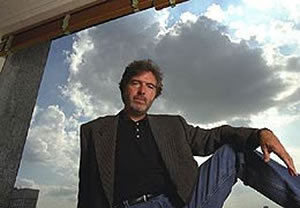
Charles Frazier (Asheville, 4 november 1950)
De Amerikaanse dichter Charles Kenneth Williams werd geboren op 4 november 1936 in Newark, New Jersey. Zie ook alle tags voor C. K. Williams op dit blog.
Tar
The first morning of Three Mile Island: those first disquieting, uncertain,
mystifying hours.
All morning a crew of workmen have been tearing the old decrepit roof
off our building,
and all morning, trying to distract myself, I’ve been wandering out to
watch them
as they hack away the leaden layers of asbestos paper and disassemble
the disintegrating drains.
After half a night of listening to the news, wondering how to know a
hundred miles downwind
if and when to make a run for it and where, then a coming bolt awake
at seven
when the roofers we’ve been waiting for since winter sent their ladders
shrieking up our wall,
we still know less than nothing: the utility company continues making
little of the accident,
the slick federal spokesmen still have their evasions in some semblance
of order.
Surely we suspect now we’re being lied to, but in the meantime, there
are the roofers,
setting winch-frames, sledging rounds of tar apart, and there I am, on
the curb across, gawking.
I never realized what brutal work it is, how matter-of-factly and harrow-
ingly dangerous.
The ladders flex and quiver, things skid from the edge, the materials are
bulky and recalcitrant.
When the rusty, antique nails are levered out, their heads pull off; the
underroofing crumbles.
Even the battered little furnace, roaring along as patient as a donkey,
chokes and clogs,
a dense, malignant smoke shoots up, and someone has to fiddle with a
cock, then hammer it,
before the gush and stench will deintensify, the dark, Dantean broth
wearily subside.
In its crucible, the stuff looks bland, like licorice, spill it, though, on
your boots or coveralls,
it sears, and everything is permeated with it, the furnace gunked with
burst and half-burst bubbles,
the men themselves so completely slashed and mucked they seem almost
from another realm, like trolls.
When they take their break, they leave their brooms standing at attention
in the asphalt pails,
work gloves clinging like Br’er Rabbit to the bitten shafts, and they slouch
along the precipitous lip,
the enormous sky behind them, the heavy noontime air alive with shim-
mers and mirages.
Sometime in the afternoon I had to go inside: the advent of our vigil was
upon us.
However much we didn’t want to, however little we would do about it,
we’d understood:
we were going to perish of all this, if not now, then soon, if not soon,
then someday.
Someday, some final generation, hysterically aswarm beneath an at-
mosphere as unrelenting as rock,
would rue us all, anathematize our earthly comforts, curse our surfeits
and submissions.
I think I know, though I might rather not, why my roofers stay so clear
to me and why the rest,
the terror of that time, the reflexive disbelief and distancing, all we should
hold on to, dims so.
I remember the president in his absurd protective booties, looking
absolutely unafraid, the fool.
I remember a woman on the front page glaring across the misty Sus-
quehanna at those looming stacks.
But, more vividly, the men, silvered with glitter from the shingles, cling-
ing like starlings beneath the eaves.
Even the leftover carats of tar in the gutter, so black they seemed to suck
the light out of the air.
By nightfall kids had come across them: every sidewalk on the block was
scribbled with obscenities and hearts.
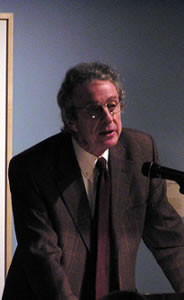
C. K. Williams (Newark, 4 november 1936)
De Amerikaanse dichter en beeldend kunstenaar Marc Awodey werd geboren op 4 november 1960 in Ann Arbor, Michigan. Zie ook alle tags voor Marc Awodey op dit blog.
3 Haiku
there were once giants
but they were
overwhelmed
by trivial concerns
*
swans are nasty birds
they honk, bite
and chase children —
poets lie for swans
*
i once tried
writing fortunes
for cookies but found
it had no
future
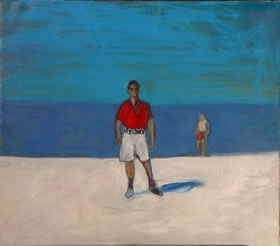
Marc Awodey (Ann Arbor, 4 november 1960)
Men on the beach door Marc Awodey
De Duitse dichter en schrijver Klabund werd als Alfred Henschke geboren op 4 november 1890 in Crossen an der Oder. Zie ook mijn blog van 4 november 2010 en eveneens alle tags voor Klabund op dit blog.
Als Gott der Herr auf Erden ging
Als Gott der Herr auf Erden ging,
Da freute sich ein jedes Ding;
Ein jedes Ding, ob groß, ob klein,
Es wollte doch gesegnet sein.
Die Kreatur in ihrer Not,
Der Mensch in Kümmernis und Tod,
Der breite Strom, das weite Land,
Sie fühlten Gottes Gnadenhand.
Es hört der Frosch zu quaken auf,
Der Hund hält inn in seinem Lauf,
Der Regen hätt geregnet nicht,
Bevor ihn Gott gesegnet nicht.
Der hohe Turm verneigte sich,
Die Antilope zeigte sich.
Und Efeulaub und Wiesengrün
Erkannten und lobpriesen ihn.
Von aller Art der Mensch allein
Geriet in Schand und Sündenpein.
Hätt er nicht Gott so oft verkannt,
Er ging noch heute durch das Land.
Hätt er nicht Gott so oft gesteint,
Wir wären noch mit ihm vereint.
Die Erde wär das Himmelreich
Und jeder Mensch ein Engel gleich.
Früher Morgen in der Friedrichstraße
Die ersten Wagen mit Zeitungsballen
Fahren am Bahnhof Friedrichstraße vor.
Alle Häuser hängen in violettem Flor.
O wilde Welt! Laß mich ins Dunkel fallen!
Die Mädchen flattern heimwärts; böse Eulen.
Aus Cafés äugen Lampen, gelb verstört.
Ein holder Walzer wird nicht mehr gehört,
Weil schon die Dampfer und Fabriken heulen.
Da braust der erste Stadtbahnzug ins Loch
Der Bahnhofshalle… Hinter Dächertraufen
Schirrt Phaeton den jungen Tag ins Joch
Und läßt die goldnen Rosse laufen.
Die Strahlenpeitsche klatscht um unser Ohr.
Des Gottes Blick erglüht uns im Genicke…
Empor zu dir! Empor!
Sonne rollt über die Weidendammer Brücke.
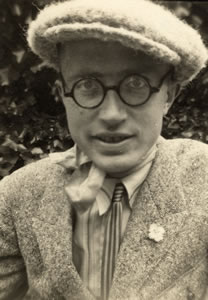
Klabund (4 november 1890 – 14 augustus 1928)
De Oostenrijkse dichter en schrijver Felix Braun werd op 4 november 1885 in Wenen geboren. Zie ook alle tags voor Felix Braun op dit blog.
Sonett
Wer je die frühgeliebte Frau verließ,
Geschieden bleibt er ganz von dem Geschlechte
Des Weibes: denn das erste, eine, echte
Gefühl verwirkt sich wie das Paradies.
Ob ich manch leuchtendes Gesicht lobpries –
Liebt ich’s? – Ach, das verarmte, da geschwächte
Herbstliche Herz, das gern noch Rosen brächte!
Doch Dahlienblätter decken welk den Kies.
Weh dem, der erster Liebe Sakrament,
Das alle Fraun in Einer hielt beschlossen,
Bricht oder löst: er wird unstet wie Kain.
Nach Freuden irresuchend, die er kennt,
Und die schal werden, wenn er sie genossen,
Muß er sehnsüchtig und unfruchtbar sein.
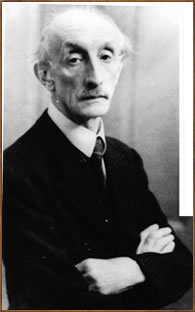
Felix Braun (4 november 1885 – 29 november 1973)
